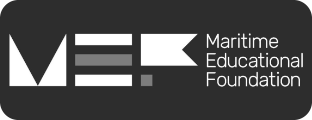Coming Ashore Podcast - Andy Hill
Posted on 15 February 2021 by Tom Saunders
On Episode 11 of the Coming Ashore podcast, Karen Waltham is joined by Coming Ashore mentor Andy Hill.
Would you rather listen? Listen on Spotify and ITunes. Or watch on Youtube.
Click here to find out more about the Coming Ashore programme. Where you'll find professional guidance, mentorship and work experience opportunities for transitioning to a career on land.
Karen Waltham:
Okay. Hi and welcome to the Marine Society Coming Ashore program podcast, where today I'm talking to Andy Hill. So Andy, firstly, thank you very much indeed, for your time today. And secondly, thank you for signing up to be part of the Marine society Coming Ashore program as a mentor. Can I kick off everything please by asking you to give us a brief history of your career to date and your background please?
Andy Hill:
Yes, definitely. Well I had a 20 plus year career at sea serving from a deck cadet to a master, and the onset of my career was shall we say a little bit of luck and having a very devoted mother who found an employer for me. I'm also just completing a 20, nearly 25 year career in the shore-based ship management, where it started out as a operation superintendent for a Japanese tanker company. And I progressed to introducing LNG carriers to European ship management in 2002 to being managing director of LNG ship management in Europe between 2017 and early 2020. I'm currently a senior advisor to ship management and strategy team in in Tokyo.
Karen Waltham:
So when you balance your career in terms of how many years were you at sea versus how many years you were at shore?
Andy Hill:
The sea going part now is lesser amount it was 20 years. 18 years of that was spent in a oil major who took me at the end of my apprenticeship, but prior to that my cadetship was with apple, lime and sugar lime bulk carriers and chemical carriers.
Karen Waltham:
That's quite a mix, but as you say, the balance between, you know, where you are in your career, now, the fact that it was 20 years versus 25 years, it's quite interesting because the people that we're talking to in the Marine Society Coming Ashore program are making that transition, and you think about the career ahead of them and you know, question, how many of them have thought of at the beginning of their career, how their career would map out?
Andy Hill:
Yeah, certainly. When I first went to sea at the age of 17, I certainly didn't anticipate that I would end my career in the position that I had. My aspirations in those days were to reach a position of master and I didn't see beyond that level.
Karen Waltham:
Do you think that's still something that does happen, do you think that people just stay with those aspirations that?
Andy Hill:
Well, I would certainly say that probably still is the case from the people I speak to. But many times now I do speak to people who see a sea going career as a shortcut to taking a shore going career in their later years. The aspiration always is to reach a senior rank level first to gain the tickets and also gain some experience to make that leap. It is of course all about the diversity of the experience that you receive. And you'll see going roles that really prepare you for a short game position. If you remain in ship management, and obviously if you do desire to leave the sea and start up a career in one of the support industries, such as insurance, or banking or the Marine services then that will usually end up with you having to learn new skills and also gain transferable experience to make that change.
Karen Waltham:
Yeah, I think as you say, when people go through the 'how far do I want to get' ,they have the aspiration but they also have the expectations they will get to a master or chief engineer depending on, you know, above or below deck. In your career, did you see many people peel off beforehand? It's like we failed as more people were taking those jumps, but what did people pay off at different levels?
Andy Hill:
They certainly did, and from my cohort of cadets I saw someone peel off at the end of their cadetship, took a career in retail and ended up coming back into ship management in an HR function at a very senior level. So that is certainly possible. Another one of my cohorts during taking my chief officer's cost to license, he left to start a career in Moor and started out just as a support function to alloying Admiralty lawyer in London and then followed up with being a partner of an advocacy law firm in the UK, and then on abroad at a later date. So it's certainly possible to break off at any time of your career. If you want to go into ship management of course you will be dealing directly with your peers, and many people do see that road eased somewhat if you get to a senior level first. We had employees at a ship management who came in having been junior officers and have made excellent superintendents and fleet managers with a great attitude towards the making things work and improving things.
Karen Waltham:
Yeah, I think it's so good to hear stories like that, because for those who think that they maybe need to get to certain levels, that isn't the case, there's all sorts of different opportunities.
Andy Hill:
It depends on the individual. It also depends on the opportunities that arise, the market conditions at the time. But what really makes the success is determination and attitude to succeed and building relationships with those that you work around to share experiences and understand the business that you're in so that you can contribute to it in a positive way.
Karen Waltham:
Yeah. Perfect. So, can you just elaborate a little bit more on your own personal experience of coming ashore? What was the thing that sparked you off to make that jump? Because people talk about the fact that that's, when I decided to do it, you know, an opportunity came, you've just highlighted that it depends on market conditions, opportunities that come to you, your determination, or your attitude and things, and people around you. So how was your experience? How did you go about it?
Andy Hill:
Well, I was, again, fortunate opportunity came my way when I was working for the oil major. I was in my transition period between chief officer and master, and they had a program of bringing a select number of people into the office environment. It was at the start of the OCHIN sire inspection program. So I was invited to become a vetting screener if you like, and an inspector working in a refinery in Singapore and I had a year really getting a taste for what shore-based life was like and having returned back to sea and having a young family, I felt that the time was right for me to try and make that transition. The key for me at the time already having reached master level, tax-free of course, making sure that my finances were in a in a situation that would enable me to do so.
Yeah, coming ashore meant a salary reduction, nearly two thirds for me to to start out. I'd say probably it took me another 10 to 12 years to sort of regain that and get back to the same sort of living standard that we had been experiencing with the seagoing career. Payback for me, of course, was I got to see my family grow, but I also was able to contribute to a growing ship management company and being in that position, of course, they were continually recruiting and being a stable member of the team, you flow with the with those recruitments and with the growth of the company, and that certainly helped me sort of grow my own career.
Karen Waltham:
Yeah. And when it comes to the pluses and the minuses and the, it's you know, the positive sides of things, as you say, they're individual, they're unique to anyone who's actually making that transition. Had you given any of that, any thought prior to that though, were you prepared for it or, you know, you'd obviously seen an opportunity, but in the early part of your career, had you at any point been asked to think about or encouraged to think about how you make that transition at all, or is that something you then had to go through yourself?
Andy Hill:
Yeah, not really, I mean I did my own little SWOT analysis, if you like, and sort of tried to identify the risks that coming ashore would have for me, the primary risk to us was more financial at that stage than it was in anything else. But coming ashore, I rapidly learned that differently from working in a foreign assignment abroad, coming ashore and working in London, commuting on a day by day basis, I actually found out that there was so many things that were different from what I thought they would be. And I often liken this to many of our recruits in the company when you're at sea, you're in port infrequently, and you have sometimes lengthy voyages, let's say between them moving into operational ship management was like being in port every day.
And after a week, that can be quite exhausting. Of course after four months, five months, you don't then get a lengthy period of leave. You have to manage with the weekends that you have, some of those you probably do need to work because you'll be traveling for business and so forth, so those weekends become very precious. But it was an interesting journey and I was determined to make it succeed. So I worked hard at it, and I think you need that element of grit to survive and grow within a shore based environment. It's not that there's lots of competition. There's a strong expectation of people to be resourceful and to provide solutions and take ownership of those solutions right the way through to their success. That brings with it a great deal of job satisfaction.
Karen Waltham:
Did you still think even in a career you've had now that in terms of where you've come from on your journey in your career, the seagoing piece was because as you say, you've got some people who didn't come up to the same level as you, because sea going experience has really helped you in where you are today?
Andy Hill:
Absolutely, I think the, the seagoing experience was key, key to who I am today, but it's also key to keeping me grounded because it's easy as you grow within an organization, in terms of your responsibility, the higher you go, the less connected you get with the seafarers who are actually providing your customer service, at the front line. You need that element of grounding to not forget where you started, not forget what is like to actually be on that front line, facing the situations that you do on that particular day, at that particular time. Particularly when you make that call and say, we need help, and it's helpful to be able to empathize and see things through their own eyes and use your experience to at least guide you in the way in which you then have a discussion with them to provide the solutions, that will get them out of that particular tricky situation. Ultimately, at the end of the day, you have to use the skill sets that you have on scene to resolve these issues. You can't just develop solutions yourself from a desk sitting in London, to a vessel that's halfway around the world in completely different circumstance ,that just doesn't work.
Karen Waltham:
In your transition, did anybody help you? Did you have anybody who helped you along the way? You had your mother at the beginning of your career, but in terms of making that transition, was anyone around to help you?
Andy Hill:
Certainly, I mean, my network at sea gave me the opportunity of my of my leap ashore. It was somebody I'd sailed with who I had subsequently met while I was doing inspections, who gave me that opportunity and advised me of the opening. But when I came ashore, it was my colleagues that were working around me. So I built up a good rapport with superintendent for the ships that I was providing operational advice to. The fleet manager at the time also took me under his wing and sort of led me in gently, but gave me challenging tasks, but was always there to support me. And my fellow colleagues who were doing exactly the same role as I was indifferent fleet teams within the company. We used to get together and and share experiences and discuss situations that we had come across and the solutions we had found. It was a little bit like swinging the lamp in the in the smoke room on board ship, telling each other's stories, and we would learn from those. So it was a very rapid learning curve, and you know it was very beneficial. It was very, very friendly, very professional and very rewarding.
Karen Waltham:
So in terms of you know, you've signed up to be a mentor, which we're very grateful because the program can't exist without the mentors. We're hoping to, get a lot of mentees coming on board now, but what do you think you're hoping to offer as a mentor on this particular program?
Andy Hill:
Certainly, I mean, I've seen the industry from many different perspectives and I have a network of people who come from a variety of backgrounds and are connected with the maritime world in many different ways. But the most important thing to me is, is that the mentee has an understanding of where they wish to go with that career. I'm very strong on individuals taking responsibility for their own development. I really truly believe that the individual is responsible for shaping their career. Those opportunities will come or not, depending on your readiness to accept them, and it's very important that you read well, you're curious, continuously curious, you contribute as much as you can to the business around you to help grow the business and help grow your own part within that business.
So you're always useful. Unuseful are always called upon when things get tight and difficulties arise. As I say, a busy person is always a most helpful person at a time of crisis and yeah, I mean just listening to people is something that I've done for my entire career and having a conversation with people and then just sharing some of those experiences. And of course, if somebody is having difficulty with something I can help them find a way out of that, but at the end of the day, it's their solutions. So it's very much having that conversation about letting them find out how best that works for them, and I think that's key to the sort of mentoring program that I'd like to be involved in, yeah.
Karen Waltham:
And that's what we're grateful for. I think it is having that listening ear, but as you say, it is important that individuals take their own ownership and their own career, go to come with some ideas, but they need a sounding board, they need something to bounce ideas off, somebody like yourself, who has been there, seen it, done it, and not all our mentors have actually sailed, you know, when you've got people going into business services that have done different things, they still mentors. But, you know, as you say, from a seagoing experience, you have made that transition. You're somebody who has had 20 years versus 25 years, or, in terms of number of years more extensive on the shore going side.. So just in closing, what do you have any nuggets or tips to anyone that's listening to this really today or reading this?
Andy Hill:
Yeah, I mean, the five P's. Always prepare, always take a step back and ask yourself, what will this mean for me? What will it representto me as an opportunity and what do I need to do to really leverage what I know to get what I need to, or what I'd like to achieve. And as I say, it's determination, it's a sense of resilience, which comes down to sort of having the grit to see things through. It's never, always easy a career at sea is never, always easy, but very often you're the gift of other people and their scheduling to put you in the right place at the right time. When you step ashore, you're very much responsible for putting yourself in way of opportunity. And it's that sort of transition of mind that really needs to be key to anybody wanting to take a career ashore.
Karen Waltham:
That's perfect. Well, Andy, thank you so much, and I really appreciate the conversation and it was very enjoyable talking to you today. And I hope others will be inspired and encouraged to get involved either as a mentee or potentially as a mentor, because there's other people who've got stories to tell. But anyway, thanks, Andy, really appreciate your time today. So thank you.
Andy Hill:
You're most welcome. And I hope that I can be helpful to the program.





